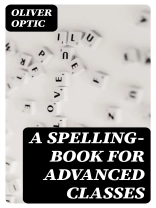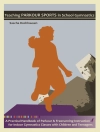In 'A Spelling-Book for Advanced Classes, ’ Oliver Optic presents an innovative approach to language education, targeting the evolving needs of advanced learners. The book is characterized by its systematic structure, merging traditional spelling exercises with contemporary usage and vocabulary. Written in a clear, accessible style, it draws upon rich pedagogical insights, reflecting the educational reforms of the late 19th century. This work serves as a vital resource, catering to the linguistic skill development essential for students preparing for more complex literary and academic challenges. Oliver Optic, the pen name of William Taylor Adams, was an influential American author and educator renowned for his engaging children’s literature. His background as a teacher and his belief in the transformative power of education profoundly shaped his literary pursuits. The urgency of providing practical educational resources during a time of societal change motivated Adams to produce this work, which emphasizes clarity, engagement, and intellectual growth in young learners. 'A Spelling-Book for Advanced Classes’ is highly recommended for educators, parents, and students seeking to enrich their vocabulary and spelling comprehension. Its thoughtful design aids in fostering linguistic proficiency, making it an indispensable addition to any educational library.
O autorze
Oliver Optic was the pen name of William Taylor Adams (1822–1897), a noted academic and author in the 19th century. Adams was a pioneer in the field of juvenile literature, distinguishing himself with a moralistic but engaging narrative style. He was not only a prolific writer but also an educator and pursued a teaching career before dedicating himself fully to literary endeavors. Among his educational contributions is 'A Spelling-Book for Advanced Classes, ’ which reflects his dedication to and expertise in pedagogy. Over the course of his lifetime, Adams authored more than 100 books, primarily under his pseudonym, Oliver Optic. His work often underlined themes of patriotism, ambition, and personal responsibility, and were targeted to inspire and educate the youth of his time. Although less discussed today, his stories enjoyed immense popularity during his lifetime, engaging young readers with tales of adventure and triumph that were both didactic and entertaining. His literary style is characterized by its straightforward narrative and didactic intentions; while some critics of his time considered his works to be too moralizing, his books were nevertheless consequential in laying the groundwork for the development of American children’s literature.












